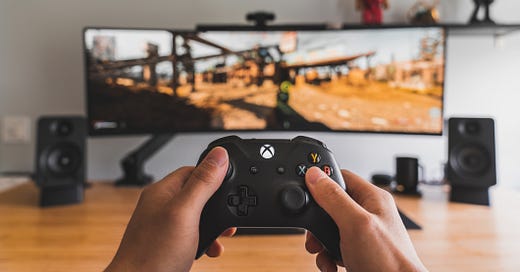Video Games: Adults Dislike Them For Our Kids, Are We Missing The Positive?
Perhaps us adults should not be so quick to dismiss video games as negative for our kids.
Many adults hate video games, yet 2.3 billion kids play them. They are part of the fabric of our youth in 2022 and does not appear to be destined to change anytime soon.
Ana Lorena Fabrega is a former teacher and edupreneur—a passionate educator outside the classroom building learning alternatives for kids. Ana is an advocate for using a game-based approach to learning. Her recent thread on twitter addressed this week’s topic with a very different perspective from that of many adults. Video games actually have educational value, 70% of kids play and she makes the case they should play more.
From Fabrega’s twitter thread:
Dr. David Deutsch is an Oxford physicist and the father of quantum computing. He’s also a huge advocate for video gaming.
In this interview, Deutsch says the evidence against gaming boils down to this: kids like video games. And some parents tend to regard children *liking* something as evidence that it is bad for them.
Deutsch argues that we have few reasons to think gaming is harmful—and lots of reasons to think it’s amazing.
Deutsch says we should do the reverse: "If children are spending a lot of time doing something, let's try to find ways of letting them do even more of it. The fact that they like doing it is an indication that it is good for them.”
So, what might make video games good for kids? Deutsch argues that they teach kids *how to think.* Other things might teach kids some content or a particular skill, but video games teach something more valuable: how to interact with the world.
Video games are essentially simulations. They give kids a chance to practice solving complex problems that mirror real life. The thinking skills they need to win games set them up for success as adults.
In reading through Dr. Deutsch’s interview, he makes the case that apart from conversation, all video games are one of only other the complex interactive learning tools that don’t require a huge initial investment (piano for example), except video games, and he thinks video games are a breakthrough in human culture for that reason.
Ana Lorena Fabrega also uses the example how video games helped Shopify founder and CEO Tobi Lutke in his learning. Games like Starcraft taught him how to develop strategies, manage resources, and invest for the long term. These lessons directly transferred to his role as a CEO.
Dr. Deutsch cites that the real value of video games are not specific lessons per say, but in teaching kids “how to teach themselves”. He believes that the “learning of mental skills that comes with learning the video game are good for learning anything”
For this reason, Deutsch says that video games are destined to be an important means of human learning for the rest of history. They give us something that humanity has never had before: “an interactive complex entity that is accessible at low cost and zero risk.”

Ana Lorena unpacks this statement in her thread.
1. COMPLEX
You can learn almost anything from a video game. They’re a way to store and transfer human knowledge, just like books. Both books and videos games are complex, but video games are also *interactive.*
2. INTERACTIVE
You can't practice with a book, but you can with a video game. You get to learn from taking action, making mistakes, and course correcting. In this way, video games are like learning the piano—but better.
3. ZERO RISK
The piano is interactive but takes lots of time to learn—and few people go pro. It's “risky.” Video games are like conversations. You can dive in, learn, and not worry about losing a big investment. But for kids, conversations come at a cost…
4. LOW COST
Kids are afraid of looking stupid or getting in trouble when they talk to adults. It shouldn’t be this way, but that’s the reality. Video games have nearly zero costs. You can make many mistakes, learn from trial and error, and keep playing.
The point of the thread from Ana Lorena, the points from Dr. Deutsch and examples like Tobi Lutke is that perhaps video games are not as evil as many think.
The point is also made, that not *all* gaming is good. It’s important for kids to learn to play video games in a healthy way.
This is where parental communication comes into play about what they are playing.
In the world of youth sport, there are benefits to kids learning about an individual sport strategy and rules as they are outlined in sport video games for example. That is not necessarily a bad thing is it?
Knowing what games our kids are playing, parental understanding of what is required for them to be good at the game, their level of improvement and discussing what they feel they have achieved by playing are all constructive outcomes from game time.
How much gaming is beneficial?
Lorena Abrega’s thread addresses that as well.
She recommends to keep your gaming < 21 hours per week. That research shows that games benefit us mentally and emotionally when we play up to 3 hours day, or 21 hours a week.
So far, no study has found negative impacts on people (kids and adults) who play Video game games less than 21 hours a week.
Studies shows that when we go to sleep, our brain focuses on the most salient problem it was recently trying to solve.
Finally, there is also a good point made on the the cultural currency to playing the games that your peers are playing, and studies show that being part of that game culture is really important, particularly for kids.
All this to say, maybe video games are not as bad as we adults think. Maybe some of this evidence is worth examining how the benefits that come from playing something our kids enjoy so much.
Want to explore a little deeper?
Jane McGonigal is a PhD Game Designer who advocates for the use of video games to help people learn skills that transfer to the real world, heal physical problems like concussions and improve attitudes and self-esteem in children. In the below podcast, Dr. McGonigal discusses how video games help with decision making, post-traumatic growth as well as how much is too much, what to watch out for and so much more.




